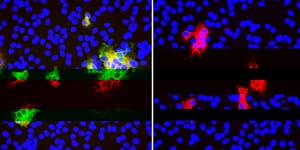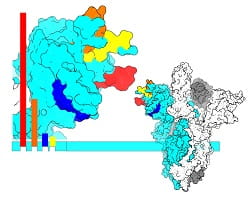
2/3/2021
PITTSBURGH – In a recurring pattern of evolution, SARS-CoV-2 evades immune responses by selectively deleting small bits of its genetic sequence, according to new research from the
University of Pittsburgh School of Medicine.
Since these deletions happen in a part of the sequence that encodes for the shape of the spike protein, the formerly neutralizing antibody can’t grab hold of the virus, the researchers report today in
Science. And because the molecular “proofreader” that usually catches errors during SARS-CoV-2 replication is “blind” to fixing deletions, they become cemented into the variant’s genetic material.

“You can’t fix what’s not there,” said study senior author
Paul Duprex, Ph.D., director of the
Center for Vaccine Research at the University of Pittsburgh. “Once it’s gone, it’s gone, and if it’s gone in an important part of the virus that the antibody ‘sees,’ then it’s gone for good.”
Ever since the paper was first submitted as a
preprint in November, the researchers watched this pattern play out, as several variants of concern rapidly spread across the globe. The variants first identified in the United Kingdom and South Africa have these sequence deletions.

Duprex’s group first came across these neutralization-resistant deletions in a sample from an immunocompromised patient, who was infected with SARS-CoV-2 for 74 days before ultimately dying from COVID-19. That’s a long time for the virus and immune system to play “cat and mouse,” and gives ample opportunity to initiate the coevolutionary dance that results in these worrisome mutations in the viral genome that are occurring all over the world.
Then, Duprex enlisted the help of lead author
Kevin McCarthy, Ph.D., assistant professor of molecular biology and molecular genetics at Pitt and an expert on influenza virus—a master of immune evasion—to see whether the deletions present in the viral sequences of this one patient might be part of a larger trend.

When the project started, in the summer of 2020, SARS-CoV-2 was thought to be relatively stable, but the more McCarthy scrutinized the database, the more deletions he saw, and a pattern emerged. The deletions kept happening in the same spots in the sequence, spots where the virus can tolerate a change in shape without losing its ability to invade cells and make copies of itself.

“Evolution was repeating itself,” said McCarthy, who recently started up a structural virology lab at Pitt’s Center for Vaccine Research. “By looking at this pattern, we could forecast. If it happened a few times, it was likely to happen again.”
Among the sequences McCarthy identified as having these deletions was the so-called “U.K. variant”—or to use its proper name, B.1.1.7. By this point, it was October 2020, and B.1.1.7 hadn’t taken off yet. In fact, it didn’t even have a name, but it was there in the datasets. The strain was still emerging, and no one knew then the significance that it would come to have. But McCarthy’s analysis caught it in advance by looking for patterns in the genetic sequence.
Reassuringly, the strain identified in this Pittsburgh patient is still susceptible to neutralization by the swarm of antibodies present in convalescent plasma, demonstrating that mutational escape isn’t all or nothing. And that’s important to realize when it comes to designing tools to combat the virus.
“Going after the virus in multiple different ways is how we beat the shapeshifter,” Duprex said. “Combinations of different antibodies, combinations of nanobodies with antibodies, different types of vaccines. If there’s a crisis, we’ll want to have those backups.”
Although this paper shows how SARS-CoV-2 is likely to escape the existing vaccines and therapeutics, it’s impossible to know at this point exactly when that might happen. Will the COVID-19 vaccines on the market today continue to offer a high level of protection for another six months? A year? Five years?
“How far these deletions erode protection is yet to be determined,” McCarthy said. “At some point, we’re going to have to start reformulating vaccines, or at least entertain that idea.”
Additional authors on the study include Linda Rennick, Ph.D., Sham Nambulli, Ph.D., of Pitt; Lindsey Robinson-McCarthy, Ph.D., formally
Harvard Medical School and now working as a virologist at
UPMC Hillman Cancer Center; and William Bain, M.D., and Ghady Haidar, M.D., of Pitt and
UPMC.
First:
CREDIT: Joshua Franzos
CAPTION: Paul Duprex, Ph.D., director of the University of Pittsburgh Center for Vaccine Research
Second:
CREDIT: Kevin McCarthy and Paul Duprex
CAPTION: Histology: Multiple antibodies (green and red) bind SARS-CoV-2 spike protein within cells (blue) when there are no deletions (LEFT). Spike protein deletions stop neutralizing antibody from binding (absence of green) but other antibodies (red) still attach very well (RIGHT). Recurrent deletion generates variants that escape from neutralization.
Third:
CREDIT: Kevin McCarthy and Paul Duprex
CAPTION: Protein Structure: Deletions in the SARS-CoV-2 spike protein sequence (horizontal cyan bar) affect the shape of different parts of the protein (cyan). Bar graph at left shows the relative frequency of recurrent deletions in the correspondingly colored part of the spike protein. Deletions tend to occur outside the region that binds to cells at the beginning of the infection.
Fourth:
CREDIT: Center for Vaccine Research
CAPTION: Kevin McCarthy, Ph.D., assistant professor of microbiology and molecular genetics at the University of Pittsburgh School of Medicine

 “You can’t fix what’s not there,” said study senior author Paul Duprex, Ph.D., director of the Center for Vaccine Research at the University of Pittsburgh. “Once it’s gone, it’s gone, and if it’s gone in an important part of the virus that the antibody ‘sees,’ then it’s gone for good.”
“You can’t fix what’s not there,” said study senior author Paul Duprex, Ph.D., director of the Center for Vaccine Research at the University of Pittsburgh. “Once it’s gone, it’s gone, and if it’s gone in an important part of the virus that the antibody ‘sees,’ then it’s gone for good.”  Duprex’s group first came across these neutralization-resistant deletions in a sample from an immunocompromised patient, who was infected with SARS-CoV-2 for 74 days before ultimately dying from COVID-19. That’s a long time for the virus and immune system to play “cat and mouse,” and gives ample opportunity to initiate the coevolutionary dance that results in these worrisome mutations in the viral genome that are occurring all over the world.
Duprex’s group first came across these neutralization-resistant deletions in a sample from an immunocompromised patient, who was infected with SARS-CoV-2 for 74 days before ultimately dying from COVID-19. That’s a long time for the virus and immune system to play “cat and mouse,” and gives ample opportunity to initiate the coevolutionary dance that results in these worrisome mutations in the viral genome that are occurring all over the world. When the project started, in the summer of 2020, SARS-CoV-2 was thought to be relatively stable, but the more McCarthy scrutinized the database, the more deletions he saw, and a pattern emerged. The deletions kept happening in the same spots in the sequence, spots where the virus can tolerate a change in shape without losing its ability to invade cells and make copies of itself.
When the project started, in the summer of 2020, SARS-CoV-2 was thought to be relatively stable, but the more McCarthy scrutinized the database, the more deletions he saw, and a pattern emerged. The deletions kept happening in the same spots in the sequence, spots where the virus can tolerate a change in shape without losing its ability to invade cells and make copies of itself.  “Evolution was repeating itself,” said McCarthy, who recently started up a structural virology lab at Pitt’s Center for Vaccine Research. “By looking at this pattern, we could forecast. If it happened a few times, it was likely to happen again.”
“Evolution was repeating itself,” said McCarthy, who recently started up a structural virology lab at Pitt’s Center for Vaccine Research. “By looking at this pattern, we could forecast. If it happened a few times, it was likely to happen again.”















